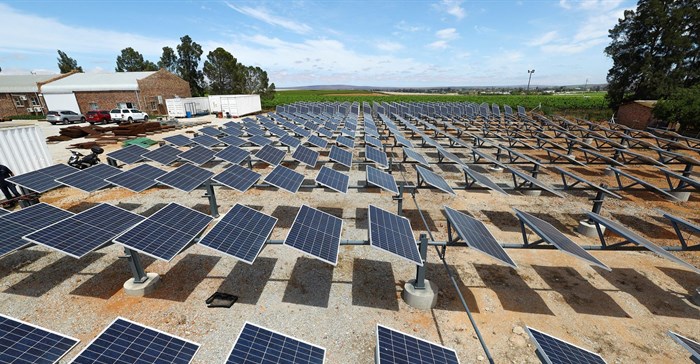The Southern African Power Pool (SAPP) and investment advisers Climate Fund Managers on Tuesday launched a new $1.3 billion target fund to build high-voltage transmission lines linking countries in the region.

A view shows solar panels at the green hydrogen proof-of-concept site in Vredendal. Source: Reuters/Esa Alexander
The Regional Transmission Infrastructure Financing Facility (RTIFF) starts with $20m in commitments from SAPP, and aims for a first close of $500m in 2025 in a bid to overcome a key obstacle constraining growth in an evolving energy sector.
Finance will be raised from public and private sector investors locally and internationally, a joint statement said.
Despite an abundance of energy sources in Africa, a lack of connections between countries has hampered integration and trade among SAPP's 12 members, which include regional economic heavyweight South Africa and top copper exporter Zambia.
"RTIFF dismantles this by enabling the private sector to work alongside public sector utilities to roll out new transmission lines at scale," Victor Mapani, chairperson of the SAPP executive committee, said in a statement.
Final close in 2 years
The facility, with a fund life of between 20 and 25 years, is expected to reach a final close of $1.3bn within two years.
A renewable energy push, including wind, solar and hydro, has highlighted the dearth of connections across the region where projects, often in remote areas, are unable to connect to national grids.
A competitive electricity market with daily trades, SAPP is aiming to connect Angola, Malawi and Tanzania to the platform and has identified eight priority transmission projects, officials said at a press launch.
10% of needed investment
"Since Malawi is already being connected to Mozambique and Tanzania is being connected to Zambia, the next key project is the connection of Angola to Namibia," Stephen Dihwa, executive director of SAPP told Reuters.
The Angola-Namibia interconnector is estimated to cost $356m, he said, around a 10th of the total investment needed for transmission lines by 2040 to enhance regional integration.
South Africa's debt-ridden power utility Eskom, which requires around R350bn over the next decade to upgrade its transmission network, is wooing the private sector for investment to overcome the country’s worst electricity shortages on record.
"The lack of investment in grid infrastructure is one of the reasons for ongoing blackouts in many parts of Southern Africa," Amit Mohan, head of private credit at CFM said.










































